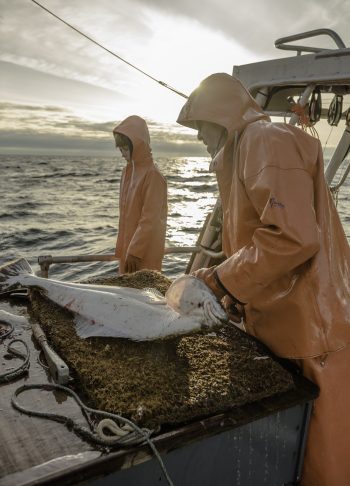Young fishermen advocate for fisheries access in Washington, DC. Photo courtesy of the Alaska Marine Conservation Council.
To many Alaskans, it is not news that it is becoming increasingly difficult for new entrants to join the commercial fishing fleet. Fishery access permits and quota are being lost from rural Alaska communities. Studies show that the average age of Alaska’s commercial fishermen is now 50, up by nearly 10 years since 1980.

Supporting the next generation of fishermen is a major focus of the Alaska Longline Fishermen’s Association, which provides training and mentorship opportunities for young fishermen. Photo courtesy of Josh Roper/ASMI.
At the Alaska Longline Fishermen’s Association (ALFA), providing support, resources, and opportunities to young people interested in entering the fishing fleet is long-term focus. This spring, ALFA hosted its second ever “Fishermen’s Expo,” an educational event that brought together industry professionals, marine safety experts, financial advisors and software engineers to provide a host of educational workshops to local fishermen, both new and experienced, entirely free of charge.
This series is part of a push by ALFA and other groups to provide more resources and educational opportunities to fishermen, especially those who are just starting out. Among workshops provided especially for young fishermen at the event, ALFA offered a beginner’s bathymetric mapping workshop. Bathymetric mapping software allows fishermen to map the seafloor while fishing to increase fishing productivity, avoid sensitive habitat, and reduce bycatch. ALFA also sponsored a workshop called “Financing your Fishing Business,” which provided instruction on qualifying for loans, best bookkeeping practices, and good financial habits for fishermen both new and experienced.
The workshops served as a pilot for the types of trainings that could be made available to fishermen in other regions with support from the Young Fisherman’s Development Program, a recently introduced piece of legislation.
Modeled after similar agricultural and aquaculture programs, the legislation would help connect and expand on existing regional efforts to provide training, education, mentorship, and apprenticeship opportunities to beginning commercial fishermen in areas such as accountable fishing practices and marine stewardship, business practices, and technical initiatives that address the needs of beginning fishermen. There is no similar program in place for supporting young fishermen working in wild fisheries.
ALFA works with the Fishing Communities Coalition and the Marine Fish Conservation Network to advocate for sustainable fisheries at the national level. In addition to its work focused on young fishermen, the groups educate lawmakers about the importance of promoting science-based fisheries management and a strong Magnuson-Stevens Act (MSA). The MSA is the primary law governing off-shore fisheries in the U.S. First passed in 1976, the law has undergone a series of amendments designed to address identified problems in the nation’s fisheries. The success of these amendments is evidenced by the recovery of 40 once over-fished U.S. fish stocks. The MSA is a successful, bi-partisan piece of legislation that has made America’s fisheries some of the best managed in the world.
By advocating for young fishermen and a strong MSA, ALFA is working with fishermen from across the country to educate Congress on the importance of sustaining our nation’s fisheries for future generations. The groups frequently bring young fishermen to Washington, D.C. to participate in and learn about the advocacy process.
The livelihoods of small boat fishermen (and their children’s opportunities to continue this lifestyle) are dependent on the health of marine environments and the productivity of fish stocks, which rely heavily on the Magnuson-Stevens Act’s power to prevent overfishing, rebuild overfished stocks, and provide for fishery dependent communities.
A strong Magnuson-Stevens Act means that young fishermen can expect a sustainable livelihood for themselves and future generations. View this handout on the MSA reauthorization from the Marine Fish Conservation Network.


